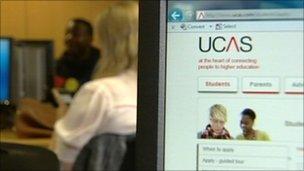Drop in Scots students applying for university places
- Published

University applications for 2012/2013 are running below the previous year's figures
The number of Scots applying for university places in both England and Scotland has fallen, according to initial figures from Ucas.
There has been a 15.4% drop in applications from those living in Scotland to study in England from 2012.
This is likely to be due to the rise in tuition fees at English universities.
But fewer Scots are also seeking places at Scottish institutions, with a 10.2% drop. The Scottish government said full figures would not emerge for some time.
The Ucas figures show applications to UK universities up to 19 October.
Across the UK the numbers applying for all courses for 2012/2013 were down by 9%, compared with 2011/2012.
However, the final deadline for most courses is not until January, when a fuller picture on applications will emerge.
'Proper support'
NUS Scotland said it had "real concern" about the figures and was worried that students were being put off applying because of the "confusion and fear of fees created by Westminster's damaging fees policy".
The drop in Scottish applicants to Scottish universities comes despite the fact these students do not have to pay tuition fees.
Robin Parker, NUS Scotland president, said: "We just hope that it's more that people are putting off applying rather than being put off from going to university altogether.
"For students from the rest of the UK, it's understandable if those potential applicants have held off before deciding whether they can afford to attend a Scottish university, as principals in Scotland have only just set their fees."
He added: "It's early days in terms of applying to university, but if this trend continues then it's clear that the Scottish government and Scottish principals will have to step in to end any uncertainty and ensure those people with the talent and ability continue to apply to go to university."
A Scottish government spokeswoman said the figures were the first in an annual cycle of information and were concentrated on applications to only a select number of courses and institutions.
She added: "What we do know now, and what parents and young people have known for some time, is that under this administration higher education will remain free in Scotland, based on ability to learn and not ability to pay.
"We also have a generous package of student support. This is why Scottish students currently have the lowest debt levels in the UK, by a significant amount, which will be reduced further as we work towards a minimum income for our students of £7,000, starting with those students from the lowest income families."
Scottish Labour's education spokesman Ken Macintosh said potential students needed more information about courses and the other costs involved in studying at university.
He urged the Scottish government to make sure proper support was in place for those wanting to take up places.
"These figures clearly show the effect that the introduction of huge increases in tuition fees is having," he said.
"Coupled with the lack of clear information from the SNP government on wider access policies, it is no wonder young people are reluctant to commit themselves to a university course.
"Just saying there are no tuition fees in Scotland is not enough as there are all sorts of other costs associated with going away from home to study."
- Published6 October 2011
- Published3 October 2011
- Published3 October 2011
- Published21 August 2011
- Published17 August 2011
- Published28 June 2010